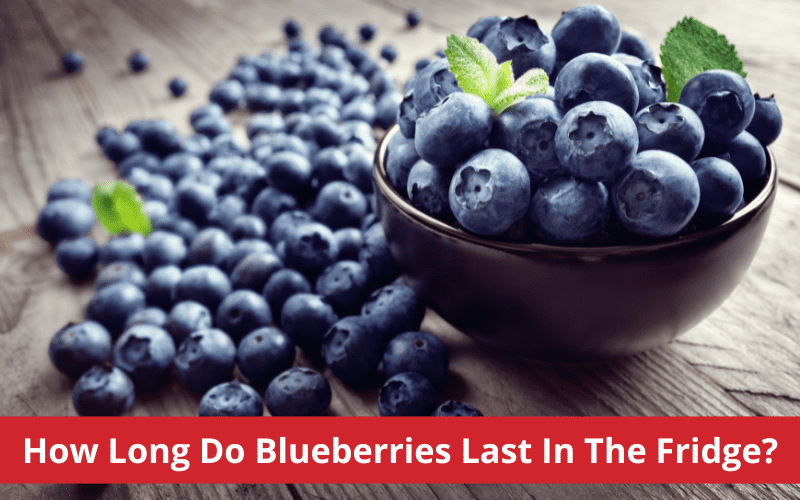Do you love blueberries? They are one of my favorite fruits! I like to eat them fresh, but I also like to use them in recipes. I was recently looking for some recipes that use blueberries, and I came across this question on a cooking forum: “How long do blueberries last in the fridge?“ I was surprised that someone had asked this question because it is such a simple thing to figure out! In this blog post, we will answer that question and give you some tips on how to store blueberries so they stay fresh for as long as possible.
How long do blueberries last in the fridge?
Blueberries are a great source of antioxidants, and they have a long shelf life. In general, blueberries will last in the fridge for about two weeks.
However, if you freeze them, they will last for about six months. Blueberries are a great addition to smoothies, yogurt, or cereal.
Which berries last longest in the fridge?
Which berries last longest in the fridge? This is a question that many people have an answer to, but it really depends on the type of berry.
- Some berries, like blackberries, last up to two weeks in the fridge.
- Other berries, like strawberries, only last about four days in the fridge. Raspberries and blueberries usually last around a week in the fridge.
So, it really depends on the type of berry that you are looking to store.
Do blueberries go bad faster in the fridge?
Blueberries are a popular fruit that is often used in baking. They are also healthy snack that is low in calories and high in nutrients. Blueberries can be stored in the fridge or at room temperature, but they will go bad faster in the fridge.
The fridge is a colder environment, so the blueberries will not last as long. If you want to store your blueberries in the fridge, make sure to eat them within a few days.
Why do berries last longer in mason jars?
Mason jars are airtight, which helps to prolong the shelf life of the berries. The jars create a vacuum seal that blocks out oxygen, which is the main culprit in food spoilage.
Mason jars also protect the berries from light, which can cause them to lose their color and flavor. By using a Mason jar, you can keep your berries fresh for up to two weeks.
Why do berries last longer in glass containers?
Berries are often stored in the refrigerator in order to extend their shelf life. This is because the cold temperatures help to keep them fresh for a longer period of time.
However, some people believe that storing berries in glass containers instead of plastic containers can also help to extend their shelf life. The theory behind this is that plastic containers can release toxins that can contaminate the berries. Glass containers do not have this issue, so the berries will stay fresher for a longer period of time.
In addition, glass containers are easier to clean and are less likely to harbor bacteria than plastic containers. So, if you are looking for a way to store your berries for as long as possible, it is recommended that you use glass containers instead of plastic ones.
How to store blueberries to make them last longer?
There are a few tricks to storing blueberries so that they last longer.
- The first step is to rinse them off and then dry them off with a paper towel.
- Then, place them in a container or bag and store them in the fridge. If you want to freeze them, you can do so by placing them on a baking sheet and freezing them for about two hours.
- Then, place them in a freezer bag or container and store them in the freezer.
By following these tips, you can make your blueberries last up to two weeks!
Are dried blueberries good for you?
Dried blueberries are a great source of fiber, vitamin C, and antioxidants. They can help to improve heart health by reducing the risk of heart disease and improving circulation. Dried blueberries are also known for their anti-inflammatory properties, which can help to reduce the risk of diseases such as cancer.
What is the nutritional value of blueberries?
Blueberries are a nutrient-rich fruit that contains many beneficial vitamins and minerals. They are a good source of dietary fiber, vitamin C, vitamin K, and manganese. Blueberries also contain antioxidants that can help protect your body against oxidative stress.
Some research has shown that the antioxidants in blueberries may help reduce the risk of cancer and heart disease. Blueberries are also a good source of folate, which is important for pregnant women and their unborn babies.
What are some recipes that use blueberries?
Blueberries are a delicious fruit that can be used in many recipes.
- Blueberry muffins. You can find the recipe online or in a cookbook. The great thing about this recipe is that you can make it as simple or complex as you want.
- Blueberry pie. Again, you can find the recipe online or in a cookbook. This recipe is a bit more complex, but it is definitely worth the effort.
- If you are looking for something a bit simpler, you could try blueberry pancakes. This recipe is also easy to find online or in a cookbook. Blueberries are versatile fruit and can be used in many different recipes.
So, next time you are looking for something tasty to make, give one of these recipes a try!
What is the difference between wild and cultivated blueberries?
- The difference between wild and cultivated blueberries is that cultivated blueberries are typically larger, have a more uniform shape, and are more intensely colored than wild blueberries.
- Cultivated blueberries are also less tart and sweeter than wild blueberries. Wild blueberries are smaller, have a more varied shape, and are less intensely colored than cultivated blueberries.
- Wild blueberries are also more tart and less sweet than cultivated blueberries.
Where do most of the world’s blueberries come from?
Most of the world’s blueberries come from the United States, specifically from the states of Michigan, New Jersey, and Oregon. In Michigan, blueberry production takes place in the Upper Peninsula and the Lower Peninsula.
The main blueberry-producing region in New Jersey is in the southern part of the state. Oregon is home to several major blueberry-producing counties, including Marion County, which is the top blueberry-producing county in the United States.
How do you freeze blueberries?
Freezing blueberries is one of the simplest ways to preserve their flavor and nutritional value. All you need is a freezer and some freezer bags. Wash the blueberries and dry them off with a towel.
Then, put them in a freezer bag and squeeze out as much air as possible before sealing the bag. Make sure to write the date on the bag so you know when they were frozen. The berries will keep for about six months in the freezer.
Is it bad to eat moldy blueberries?
Moldy blueberries might not be the best thing to eat, but they won’t necessarily kill you. If you have a few moldy berries, you can probably just avoid eating them. However, if there is a lot of mold on your berries, it’s best to just discard them.
Can you make jam out of rotten blueberries?
Rotten blueberries are the bane of any jam-maker’s existence. The sugars in the berries have already turned to alcohol, and the fruit is generally mushy and discolored. However, it is possible to make jam out of rotten blueberries. The end result will not be as sweet as if you had used fresh berries, but it will still be edible.
- To start, you will need to remove any moldy bits from the berries and discard them. Then, put the remaining berries in a pot and mash them with a potato masher or a fork. Add sugar and lemon juice to taste. Bring the mixture to a boil, then reduce the heat and simmer for about 20 minutes, stirring occasionally.
- If you want your jam to be a bit more firm, you can add pectin. Pectin is a natural thickener that is found in fruits like apples and plums. Add 1/4 teaspoon of pectin per cup of mashed blueberries. Bring the mixture to a boil, then reduce the heat and simmer for an additional 5 minutes.
Pour your jam into jars and seal them with lids. Let them cool on the counter before putting them in the fridge. Your jam will keep for about 2 weeks in the fridge or 6 months in the freezer.
What should you do if your child eats a moldy berry?
If your child eats a moldy berry, it is important to seek medical attention as soon as possible. Although rare, there is the potential for your child to develop a life-threatening illness after consuming a moldy berry. Symptoms of this illness can include fever, vomiting, and diarrhea. By seeking medical attention, you can ensure that your child receives the necessary treatment and support.
Why are some people allergic to blueberries?
There are many reasons why people might be allergic to blueberries.
- For some, the berries might contain a protein that their body mistakes for a harmful substance, leading to an allergic reaction.
- For others, the blueberry itself might be the allergen, triggering symptoms like sneezing, watery eyes, and a runny nose.
- Some people might also be allergic to other fruits in the Vaccinium genus, such as cranberries and bilberries.
If you think you might be allergic to blueberries, it’s best to speak with a doctor to find out for sure.
Conclusion
In conclusion, now you know how long do blueberries last in the fridge – blueberries can last in the fridge for up to two weeks, but they will start to lose their flavor and nutrients after a week. If you want to extend their shelf life, you can freeze them for up to six months. When stored properly, blueberries can be a delicious and healthy snack that will last for a while in your fridge. Thanks for reading!

